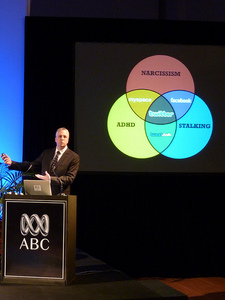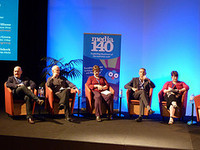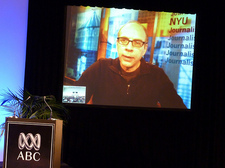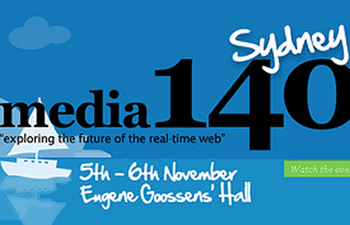Over 300 people gathered under the Media140 banner in a concert hall at Australia’s national public broadcaster ABC in Sydney last week to consider the future of journalism in the social media age.
Media140 is a newly formed global collaboration of journalists, academics and social media practitioners that is staging conferences around the world. The goal is to examine the impact of the real-time web on news and media industries. It was founded in the UK last February by media worker Andrew Gregson. (Disclosure: I was the editorial director for Media140 Australia. Profits from the event will be donated to The Big Issue, a magazine designed to empower the homeless.)
Our conference at the bottom of the world rose to No. 4 on Twitter’s trending topics after just a few hours. Issues on the agenda included the role of Twitter in reporting the Iran uprising; professional and ethical guidelines for journalists using social media; and how political reporting is being changed by journalists’ adoption of social media platforms.
The gathering tested some professional journalists’ assertions about the threat to quality reporting allegedly posed by Twitter. It also challenged claims on the territory made by social media experts. In the end, we established that Twitter is the platform propelling Australian journalists into the social media age, while also broadening the base of the movement to reinvent journalism.
The line-up featured some of Australia’s most respected and prolific journalists, academics and bloggers. Tensions arose on stage and online during the conference between old rivals, over newly contested territory, and in pursuit of redefinitions of journalism. While hundreds mingled at the ABC, hundreds more participated online via Twitter, a live ABC webcast, a Ustream video feed, and live blogging.
The ABC of Social Media Guidelines

The ABC’s managing director, Mark Scott, was the first keynote speaker. He used the event to launch the most progressive social media policy that I’ve seen from a large media organization.
“I wanted to title my talk ‘Making This Up as We Go Along’… because to a degree that’s what we’re doing,” he said.
Essentially, the simple guidelines empower ABC employees to freely use social networking sites and tools for professional and personal purposes, with the rider that they be careful not to undermine their professional practice, nor their employer’s reputation. The policy outlined four key rules:
* Do not mix the professional and the personal in ways likely to bring the ABC into disrepute.
* Do not undermine your effectiveness at work.
* Do not imply ABC endorsement of your personal views.
* Do not disclose confidential information obtained through work.
“We need to experiment and we need to give our staff the space to experiment,” Scott said.
The new ABC guidelines strongly contrast with the position adopted by the Australian Financial Review, which recently banned its staff from using Twitter professionally. (In a forthcoming MediaShift post, I’ll analyze Australian media outlets’ attempts to negotiate ethics and professionalism in this new territory).
Scott has dragged his staff — some kicking and screaming — into the social media age. He acknowledges that these new platforms are part of the public broadcaster’s future. In his Media140 address, he pointed out that Twitter is just another “t” in a progression from telegraph to telephone to telex, and so on. He also showed how Twitter could easily fit within the realm of breaking news by offering tweet-length posts for some of the major stories of the past century.
Nevertheless, skepticism remains. The ABC’s most senior political reporter, Chris Uhlmann (christened by the ABC chief the “Harpo Marx of Twitter” for his virtually mute state in the sphere), said, “I just don’t see how I could verify sources from Twitter.”
There were pockets of internal resistance to the ABC’s involvement in Media140. But as the conference progressed, I heard that many journalists at the public broadcaster were watching the feed from their desks. Some of them eventually ventured onto the conference floor, while others contacted me after the conference was over.
The challenge now for progressive industry leaders like Mark Scott is to adequately support journalists so they can use social media as an integral part of their beat. As the ABC radio’s chief political correspondent Lyndal Curtis blogged during the conference, many already over-laden journalists are simply “too tired to tweet!”
Tweeting Politics and the Clash of the Titans
As I reported earlier this year, there has been a veritable explosion of Australian journalists in the Twittersphere. Today, Twitter is changing the way political reporters interact, and has broken a century-long tradition that prohibited live reporting from the Australian parliamentary chambers.
As the Sydney Morning Herald’s Annabel Crabb told the conference, reporters are tweeting the daily Question Time sessions. Journalists are using Twitter to interact with each another and a broadening base of engaged civic tweeters. People are even challenging politicians via tweets as debates play out on the floor of the House.

While some journalists and organizations move forward, working on building new audiences by engaging through social media, conflict is emerging between publishers like Rupert Murdoch’s News Corp. and public broadcasters such as the ABC and the BBC. Mark Scott recently compared Murdoch’s last grasps at control — re-erecting pay walls and, as of this week, musing about blocking content from Google — with the desperation of an emperor experiencing the fall of Rome.
On stage at Media140, the award-winning author and journalist, Caroline Overington expressed genuine alarm at the rising, monopolistic power of public broadcasters like the ABC in the new media landscape. She launched into a strident defense of Murdoch (whom she described as “benevolent”) and his vision for newspapers.
She also revealed a hint of company strategy by indicating News Corp.‘s plans were also linked to the development of a media consumption device, which is now facetiously being referred to in Australia as the iRupert or the Ru-pod. Overington also challenged rival, Annabel Crabb, with assertion that the Sydney Morning Herald, a Murdoch competitor, was in very dire financial straits.
That drew the retort from Crabb: “I think it is wonderful that your survival strategy depends on the robust genes of a 78-year-old… We are not in as much trouble as you will be once your great leader drops off the twig.” Cue peals of laughter. (You can view the entire panel on Social Media and Political Reporting here.)
The Mass Media as the Masses’ Media
One academic speaker told the conference that “the hoards are at the castle gates.” I took this analogy further in my closing remarks at Media140. From my perspective, the masses aren’t just threatening to storm the castle — they’ve overrun it. Mass media has become the masses’ media. Unless the mainstream media wants to be left behind to starve, it needs to join the revolution and figure out new ways of funding, filtering and curating stories to ensure the hard work of journalism — shining a light in dark places — can continue to be done.
“For the first time in human evolution we are co-creating the human narrative, never again will our histories be held hostage to the victors, our stories forgotten, unwritten, unscribed,” said social media activist Laurel Papworth.

This point was driven home in the question-and-answer session that followed a presentation delivered via Skype by NYU journalism professor Jay Rosen. During his talk, Rosen outlined a clarion vision for journalism in the social media age via 10 key points. Then a journalist in attendance got up and expressed fear about giving the “audience” the reins.
“If you don’t have a democratic heart, you don’t belong in journalism in the first place,” Rosen said.
Media140 Sydney was an attempt to bridge the gap between the mainstream and the fringes, to negotiate change, and to provide a platform for the collaborative reinvention of journalism. Thousands of tweets, many new connections, and a few minor brawls later, the global conversation — in newsrooms, on Twitter and blogs — continues to reap dividends for journalism’s reinvention.
In the coming weeks I’ll outline more of the lessons learned and the progress being made in the wake of Media140. But, for now, the last word should go to SBS online news and current affairs editor, Valerio Veo, who told Media140 “I am the bastard child of old and new media… like a child of a broken home — [I] care deeply for both my divorced parents, despite their temporary differences.”
Images by neeravbhatt via Flickr


Thanks Julie! Can’t wait for the next installment.